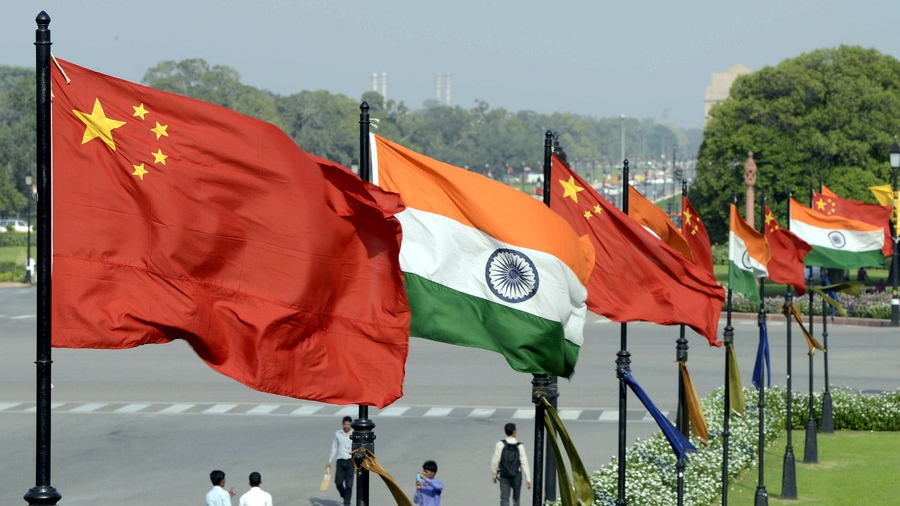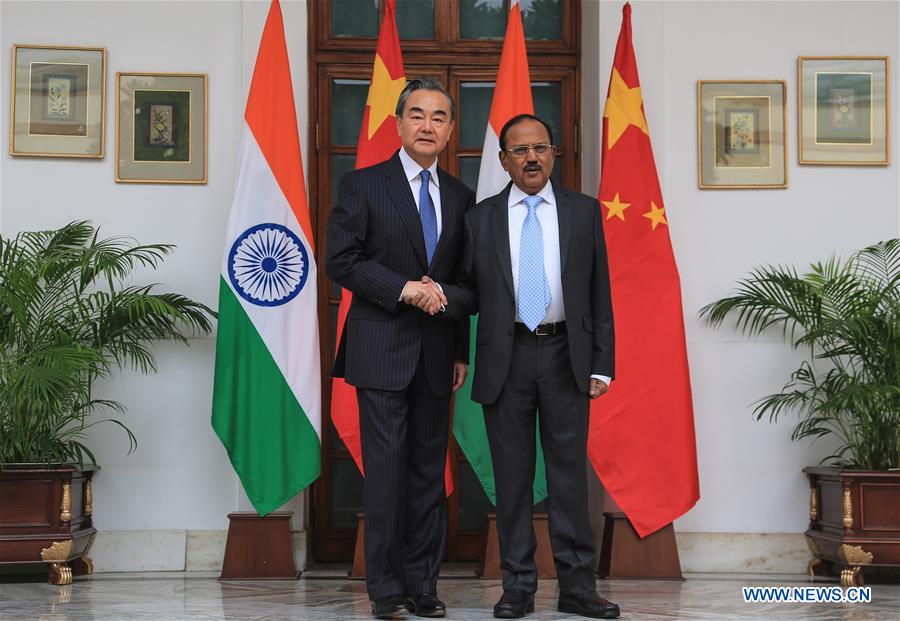
Indian and Chinese national flags flutter side by side on the lamp posts at the Raisina Hills in New Delhi, September 16, 2014. /Xinhua
Indian and Chinese national flags flutter side by side on the lamp posts at the Raisina Hills in New Delhi, September 16, 2014. /Xinhua
Editor's Note: Bobby Naderi is a journalist, current affairs commentator, documentary filmmaker and member of the Writers Guild of Great Britain. The article reflects the author's opinion, and not necessarily the views of CGTN.
India can rest assure that it has a comfortable relationship with the West, but it's a strategic miscalculation to believe that it also has friends and allies in Western capitals if it throws stones at China in the Himalayas.
India's alliance with the West has been and still is a mile-wide and an-inch-deep, particularly in regards to manufacturing a crisis with China on the roof of the world.
In such isolation, joining an American campaign against China is suicidal, too. India and the U.S. don't mix and their relationship has its limits, even if Washington, a very unreliable partner, calls India a "major defense partner."
If in doubt, ask European leaders who have run out of patience with President Donald Trump and his America-first shenanigans. They have been unable to recalibrate the transatlantic treaty with the president who calls the all-American protesters in the streets of hundreds of cities and towns "terrorists."
The much-touted "special relationship" between the U.S. and the UK is another example, predominantly after London signed a 5G deal with Huawei against Washington's national security concerns.
Oddly enough, the same manufactured concerns didn't stop the U.S. Department of Commerce from giving the go-ahead to American companies to work with the Chinese telecom giant on next generation 5G networks.
To put it in perspective, China is today ascendant, America's influence is in decline, and New Delhi has a lot to lose if it goes out of its way to trust Trump at the expense of Beijing. He does what he wants in the Oval Office. He calls the EU a foe and threatens to quit the NATO.
In the grimmest sense imaginable, a lot could also go wrong for New Delhi if it capitalizes on Trump's decoupling trend and anti-China rhetoric.
The inescapable truth is that the border tensions are political in nature, discussions are still ongoing through political and diplomatic channels, and a reset of the political narrative may be needed to defuse the powder keg situation.

Visiting Chinese special representative, State Councilor and Foreign Minister Wang Yi (L) shakes hands with Indian special representative and National Security Adviser Ajit Doval at the 22nd meeting between Chinese and Indian special representatives on boundary issues in New Delhi, India, December 21, 2019. /Xinhua
Visiting Chinese special representative, State Councilor and Foreign Minister Wang Yi (L) shakes hands with Indian special representative and National Security Adviser Ajit Doval at the 22nd meeting between Chinese and Indian special representatives on boundary issues in New Delhi, India, December 21, 2019. /Xinhua
Under international law, China has the right to defend its territory in the Himalayas. China's claim over the Himalayan border is internationally valid and legal. Indian policy makers and corporate India stand to win if they recognize that right and restrain their frontline troops.
Indian troops should never be allowed to stoke instability in their neighbor's country. If they are looking for insurance against war and instability, they will find it only in their neighbors' prosperity and goodwill. In an era of globalized trading, they cannot provoke and refute China in several quarters without a consequence.
According to Apparel Export Promotion Council of India, India is a huge market for Chinese exports and has a positive trade balance with China. With over 600 billion U.S. dollars in annual trade, the U.S. cannot decouple from China's economy. With nearly 90 billion U.S. dollars in annual trade with China, the same issue exists for India. It cannot totally cut off all economic dependencies.
According to Brookings Institute and Venture Intelligence, China plans to invest 26 billion U.S. dollars in India. There are also huge trade opportunities for Indian businesses to explore in Chinese market.
In a more general sense, blocking China out is deeply unimaginable. Since there are no alternatives, putting restrictions on Chinese imports will burden Indian consumers and impact exports.
Amid economic uncertainty, some politicians in New Delhi are still painting themselves into a corner by manufacturing a crisis in the Himalayas to distract the public from their own failings. The radicalization of the conflict with China for policy ends is not a minor affair at all. It is going to carry with it terrible consequences, particularly if nationalist parties win the next general elections.
It's a tall order that politicians on Capitol Hill support a strong U.S.-India partnership. In our all-too-often unsavory world, they hardly walk the talk.
The underlying view seems to be that the U.S. has disengaged from friends and foes by walking out of many international treaties and agreements. It's immature to conclude that per the "Indo-Pacific" strategy, official Washington would drag itself into bloodshed at the top of the world.
In this never-ending pandemic moment of ours, it is incumbent on New Delhi to develop a trusted relationship with Beijing. The absence of it will up the ante on hostilities – economic, political, and military – and impede their diplomatic ability to respond in a crisis.
Common sense dictates that they abandon hostile attitudes toward Chinese policies and revert to a more realistic, practical approach to bilateral relations. Intense hostility is just what they don't need right now over the Line of Actual Control in the Himalayas.
(If you want to contribute and have specific expertise, please contact us at opinions@cgtn.com.)